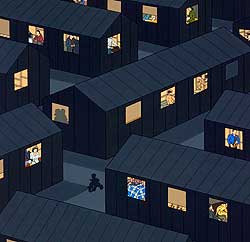Ethnic profiling is illegal in the United States, prohibited by the Fourth Amendment, which requires probable cause for searches and seizures, and by the 14th Amendment, which calls for equal protection under the law.
And yet, as the recent arrest of Harvard scholar Henry Louis Gates demonstrates, the issue remains far from settled.

Courtesy Photo
“Night Watch #3” (2007) by Roger Y. Shimomura, from his series “Minidoka of my Mind.” During World War II, Shimomura was sent with his family to an internment camp for Japanese Americans. Shimomura will talk about the experience on campus Oct. 12.
Recent statistics compiled by the state of Missouri show that black drivers are 67 percent more likely to be pulled over than white drivers. In the wake of 9/11, a Cornell University poll found that almost half of Americans believe government should restrict the civil rights of Muslims. And this spring, a report from the American Civil Liberties Union argued that U.S. authorities detain thousands of people each year solely “on the basis of religion, race or nationality.”
This fall, Washington University will present a semester-long series exploring the history, impact and ethical issues surrounding ethnic profiling.
“Ethnic Profiling: A Challenge to Democracy” will include lectures, debates and panel discussions as well as workshops, performances and film screenings.
“‘A Challenge to Democracy’ will draw upon academic researchers from philosophy, political sciences, history, law, social science, business, medicine and other disciplines,” said Stuart D. Yoak, Ph.D., executive officer of the Center for the Study of Ethics & Human Values, which organized the series.
“The series will demonstrate the power of approaching a complex ethical topic — involving both scholarly and practical concerns — from a multidisciplinary perspective,” Yoak said.
“Included will be experts and professionals in public policy, law enforcement and national security charged with the practical application of values concerning ethnic profiling,” he said.
“A Challenge to Democracy” takes its name from a World War II propaganda film defending the U.S. government’s forcible internment of approximately 120,000 Japanese Americans. Though upheld by an infamous Supreme Court ruling — Korematsu v. United States (1944) — the internments later were judged by a 1983 congressional report to have been “not militarily necessary” and motivated by “anti-Japanese agitation (that) fed on racial stereotypes and fears.”
Several events will deal specifically with the internments. In August, the Freshman Reading Program — which aims to provide incoming students with a common intellectual experience — will center on Julie Otsuka’s novel “When the Emperor Was Divine,” which explores the effects of internment on a Japanese-American family. Otsuka will speak about her work Sept. 15 as part of the Assembly Series.
The Performing Arts Department in Arts & Sciences will host “Dancing Who I Am,” a panel discussion and dance concert exploring the role of ethnicity in dance, Sept. 12. Participants will include critic Elizabeth Zimmer, former dance editor of The Village Voice; and Thomas DeFrantz, Ph.D., a professor of music and theater arts at Massachusetts Institute of Technology.
On Oct. 2, Michael Adams and Gyo Obata will discuss how internment impacted their respective families. Obata, a co-founder of HOK, the worldwide architecture firm based in St. Louis, is the son of noted California painter Chiura Obata. During the war, the Obata family was sent to the Topaz War Relocation Center in central Utah, but Gyo — like many other Japanese students — was able to avoid internment by continuing his education at WUSTL, where he enrolled at the School of Architecture.
Michael Adams, also a WUSTL alumnus, is the son of famed photographer Ansel Adams. In the 1930s, Ansel and his wife, Virginia, sold work by Chiura Obata through their Yosemite gallery, Best’s Studio.
In 1943, Ansel — departing from his signature landscape images — created a series of photographs documenting life in California’s Manzanar War Relocation Center, which he published the following year as a book, “Born Free and Equal.”
Immediately following the talk, the Mildred Lane Kemper Art Museum will open a Teaching Gallery exhibition titled “A Challenge to Democracy: Ethnic Profiling of Japanese Americans During World War II.”
Jointly curated by Angela Miller, Ph.D., professor of art history and archaeology in Arts & Sciences, and graduate students Elissa Weichbrodt and Anna Warbelow, the exhibit will explore the pervasive nature of ethnic profiling through a variety of visual records and material ranging from books and magazines to a sampling of photographs by Ansel Adams and paintings by Chiura Obata.
Chiura’s art also serves as a backdrop for “Dust Storm: Art and Survival in a Time of Paranoia,” a one-man play about the camps written by Rick Foster and performed by Zac Drake Oct. 3 and 4.
On Oct. 12, celebrated painter Roger Y. Shimomura, who spent the war in the camps with his family, will discuss how the experience shaped his work for the Sam Fox School of Design & Visual Arts. Other events will include concerts, poetry readings and theatrical performances as well as discussions of ethnic profiling in dance, fashion, law, philosophy and other fields.
All events are free and open to the public. For updates, a complete schedule or more information, call 935-9358 or visit humanvalues.wustl.edu.